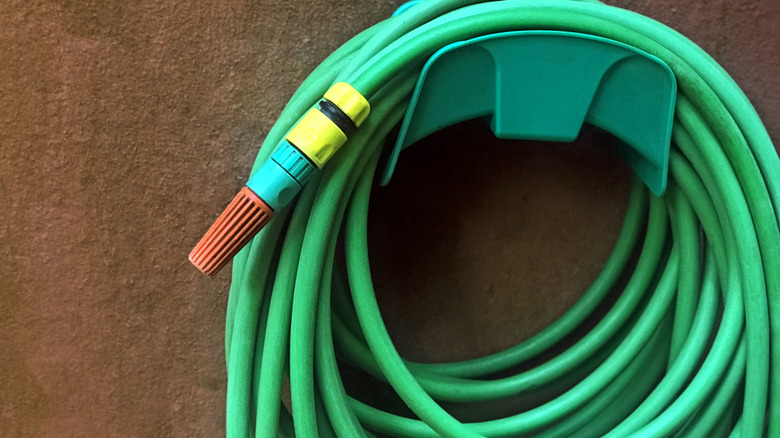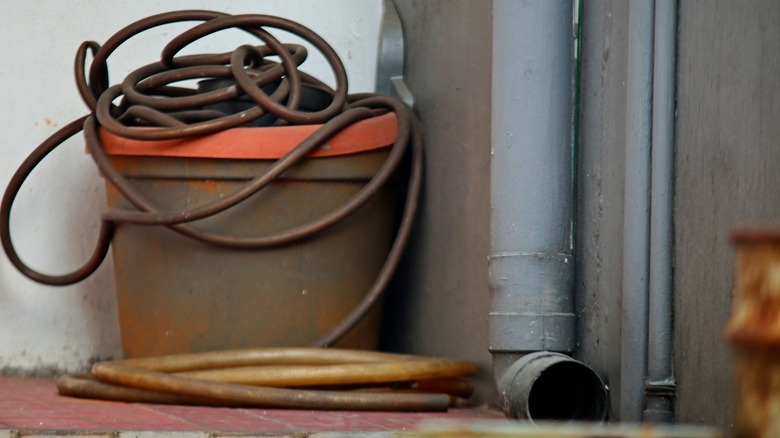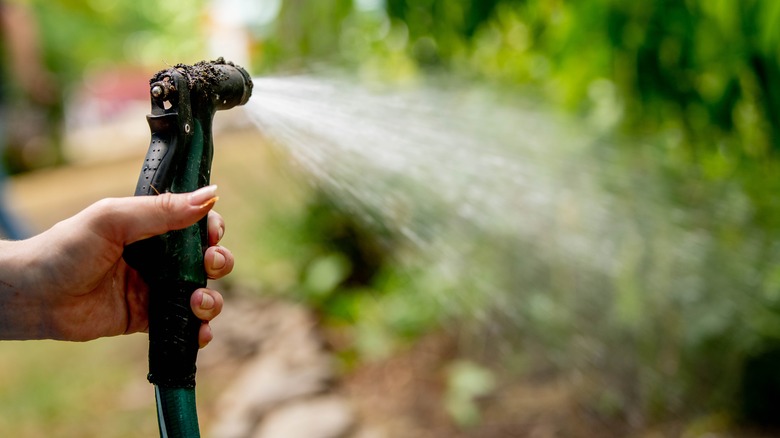If Your Garden Hose Is Giving Off A Foul Smell, Here's What It Could Mean
We may receive a commission on purchases made from links.
It's time for your plant's morning drink. You head over to your backyard spigot and turn on your garden hose. What comes out, along with the water your plants are thirsting for, is an honestly pretty gross odor. Before you give up entirely and start considering ways to repurpose your old hose and use it in your garden, try to get to the olfactory bulb of the problem. The source of yucky garden hose smells ranges from stagnant water sitting in disused piping to the presence of heavy metals, chlorine, and hydrogen sulfide gas from sulfur bacteria in your water source. To work out what you're dealing with, identify the type of smell. For example, does the hose smell like rotten eggs or chemicals? From there, it's a process of elimination.
Is a bad-smelling garden hose even a problem? Well, aside from the assault on your senses, it could also mean you have some level of contamination in your hose or water, be that simple algae growing in the tube (a problem with a simple fix) to a big flush of chlorine from your municipal water management company (they do that to disinfect the water after, for example, flooding or a storm) to sewage from infiltration from broken plumbing in your backyard (ew). It's not just a problem for your garden, either. Water from a garden hose can be pushed back into your drinking water system. Getting it sorted out quick-smart is a must.
Blame the gassy bacteria in your garden hose or water
No matter which stylish garden hose storage hacks that make clutter a thing of the past you use, if you don't unravel your hose and flush it with water often, it can get stinky. Water sitting in a hose stagnates; it's full of teeny insects and bacteria that give off an undesirable odor. This is particularly a problem if a poorly maintained hose is left languishing outside to collect insects and dirt. Conversely, new garden hoses might also emit a smell. The chemical odor (and foamy residue) comes from the plastic the hose is made from. If you run water through the hose for a while and it still smells, contact the manufacturer or the store you bought it from for advice.
If what you're smelling is reminiscent of an egg gone bad, you could be dealing with sulfur bacteria in the water. These microscopic nasties emit hydrogen sulfide gas, giving water its distinctive sulfur smell. In this case, it's not the hose that's the problem, but the water running through it. This bacteria can build up in any water source, from wells to rainwater collection or storage barrels to reservoirs filled with decomposing organic matter or algae blooms. Alternatively, water with little oxygen — in, say, a water tank — turns anaerobic, producing smells for a similar reason. Thankfully, these issues rarely pose a health hazard, though some sources claim high levels of hydrogen sulfide gas can cause nausea and headaches.
Is chlorine the reason behind offensive garden hose smells?
Does your garden hose smell like your swimming pool or hot tub? You can likely blame chlorine, which gives off a bleach-like scent when it contacts organic materials. Sometimes, ammonia is used in conjunction with chlorine to disinfect public water, creating chloramine, which also produces a nostril-offending smell. At appropriate levels, like what your local water body adds to your city's drinking water or that is recommended for disinfecting pools, chlorine is safe for mammals, including humans and birds. (Reptiles, amphibians, and fish ... Not so much.) Again, this is an issue with the water, not the piping.
Now, you're probably wondering how to get rid of these highly offensive smells. Trust us, you'll never have problems with your hose again with these genius hacks. The first thing you should do is simply turn on the faucet to the garden hose to flush out stagnant water and anything, like algae or insects, that has collected inside it. Run the hose until the water is clear and scent-free — up to 10 minutes. Do this after every 24 hours away from home, too, to avoid leaving water standing in the hose for too long. If it's still giving off putrid fumes and your garden hose is aging, it's probably time to invest in a new one. Fitting your outdoor faucet with a garden hose water filter — for example, Amazon sells an easy-to-install Waterspecialist hose protector kit for well under $20 — may also help.


